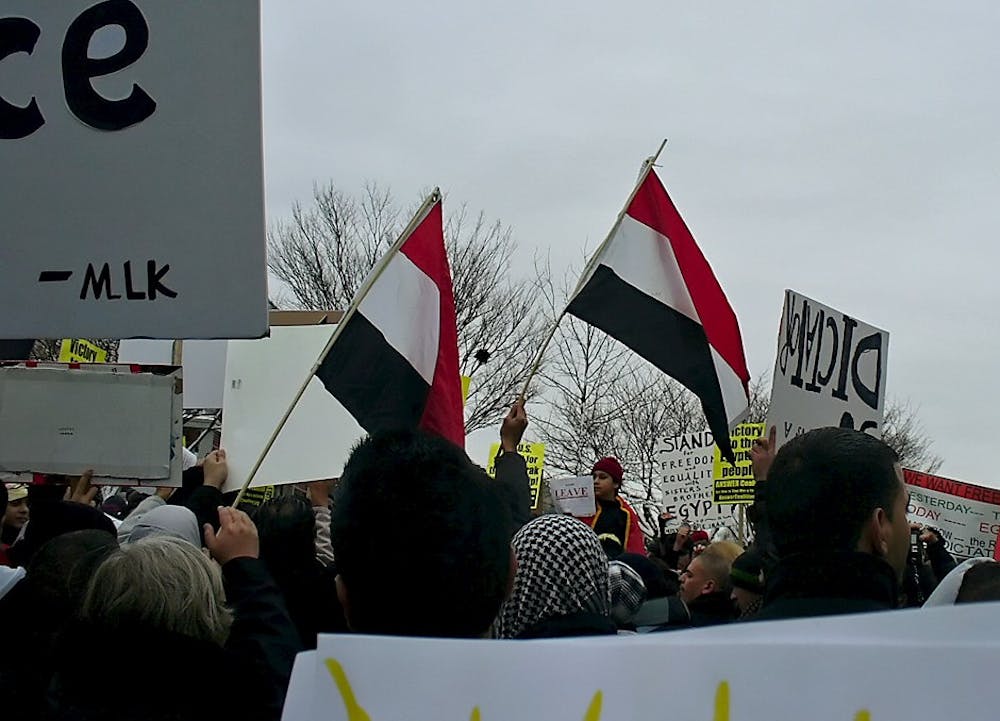
The reverberations of the Egypt protests against President Hosni Mubarak’s nearly 30-year-old regime have been felt a world away, here on campus.
When College junior and Egyptian national Marwa Ibrahim initially heard about the protests, she didn’t think much of them.
“I didn’t think it would go this far … because Egyptians are generally very apathetic about politics” after 30 years of little political change, Ibrahim said.
She realized the magnitude of the protests when — the day after she heard about them — communication to the country was cut off.
By calling an Egyptian landline using Skype instead of a traditional phone, Ibrahim was able to circumvent the restrictions placed on communication.
“I’m very proud of the Egyptians who are my age — young university students, recent graduates who have taken it upon themselves to go onto the streets and protests … forming part of a very organic movement,” she continued.
Ibrahim, who attended a demonstration at the Egyptian Embassy in Washington, D.C. this past Saturday, has learned through recent conversations with her family in Egypt that there’s “so much positive energy out there.”
For Near Eastern Languages and Civilizations Department Chairman Roger Allen — whose close friend and literary figure Gaber Asfour has been recently named the new Culture Minister of Egypt — there is a misconception in the western world about the possible alternative to a regime headed by Mubarak. The idea that a shift from Mubarak’s currently secular government would lead to a government dominated by religion is unfounded, Allen said.
He cited the Muslim Brotherhood, the world’s largest Islamic political group, as an example of a party that is “thoroughly organized.”
“These aren’t fanatics waving the Quran around. They are … professionals who wish to somehow find a new balance” between secularism and religious government, he said.
Engineering freshman and Egyptian national Karim El Sayyad thinks it’s too early to predict the outcome of the protests, but Egypt is “moving towards a more democratized system, and I think the ramifications are going to be felt throughout the Middle East,” he asserted.
El Sayyad’s family in Egypt fled to the United Kingdom, but his father recently returned to Egypt “to protect the house from the looting that’s been going on,” he said.
There are two Penn study abroad programs based in Cairo, but there are currently no Penn students studying abroad in Egypt, according to Penn Abroad Director Barbara Gorka.
College sophomore Alex Amaniel still has plans to study abroad in Egypt next fall. In light of the protests, though, those plans are not set in stone.
“I wanted somewhere that was a conduit between African culture and politics and Middle Eastern culture and politics,” Amaniel said of his decision to study in Egypt.
“If I had to decide tomorrow, I wouldn’t be going,” he continued, adding that he still plans to turn in his application and continue monitoring the situation in Egypt.
“By the time November elections roll around, I think we’re definitely going to be seeing some changes in Egyptian politics,” Amaniel said.
The Daily Pennsylvanian is an independent, student-run newspaper. Please consider making a donation to support the coverage that shapes the University. Your generosity ensures a future of strong journalism at Penn.
DonatePlease note All comments are eligible for publication in The Daily Pennsylvanian.




